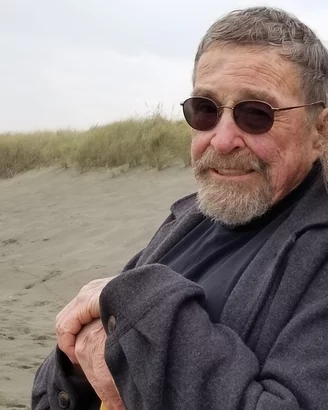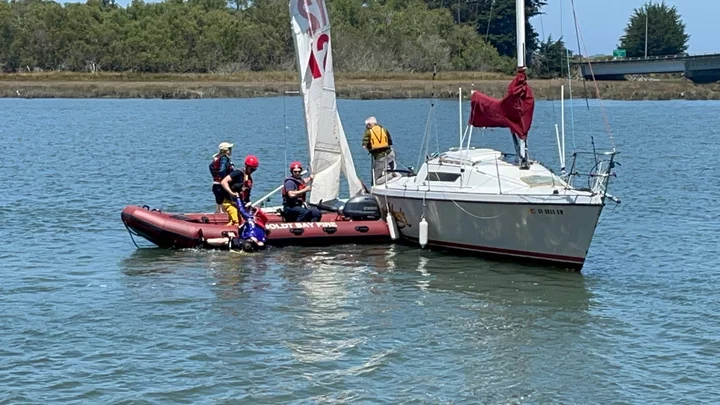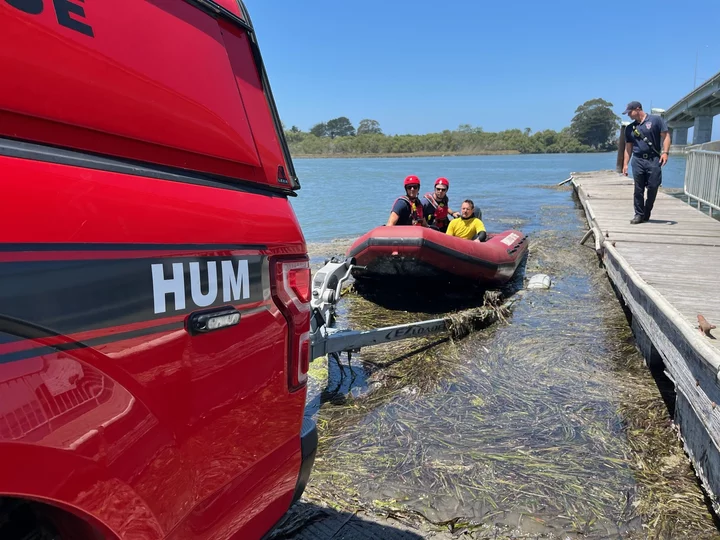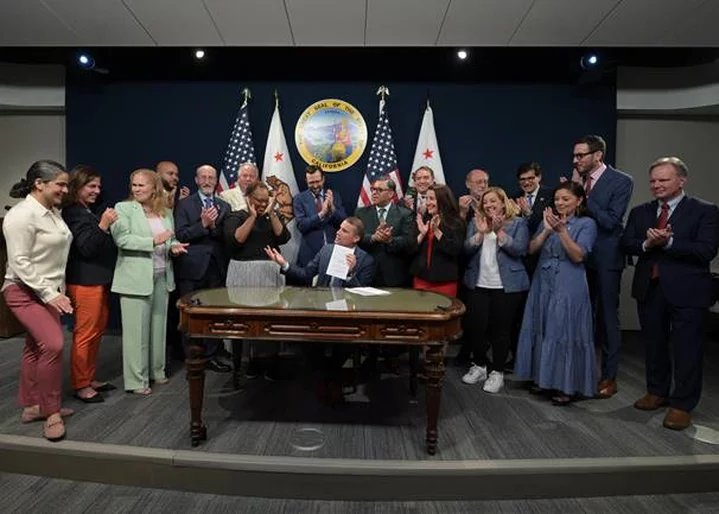OBITUARY: Michael Gene Mullen, 1937-2024
LoCO Staff / Saturday, July 6, 2024 @ 6:56 a.m. / Obits
Mullen, Michael Gene, age 87, died June 23, 2024; Kenzie Mullen, his wife of over 40 years, was with him when he passed peacefully at St. Joseph Hospital in Eureka.
The son of Virginia and Robert Mullen, Mike Mullen was a committed and lauded artist his whole life, and a longshoreman for 35 years: a union advocate, he was president of his local as well as president of the pensioner’s club, and held other important offices. The owner of a Victorian he lovingly restored, Mike was a tremendous gardener, a world traveler, and a collector of art as well as a great supporter of local artists. Sober for 40 years, he was an effective and beloved AA sponsor, as well as a frequent and generous entertainer, well-known for his sense of humor and his talent as a storyteller.
Mike is sorely missed by his wife Kenzie Mullen, his brother Don Mullen of Oakland, his half-sister Kerry McGinn of Spokane, as well as his children, Laura Mullen, Ben Mullen, and Lynn Collins, and grandchildren, Sean Mullen, Kevin Mullen, and Monique Ridgeway, as well as his great-granddaughter Evelyn Ridgeway, and the wide circle of dear friends he and his wife collected.
Donations in Mike’s memory might be sent to the Humboldt Arts Council, Miranda’s Rescue or the American Friends Service Committee.
###
The obituary above was submitted on behalf of Michael Mullen’s loved ones. The Lost Coast Outpost runs obituaries of Humboldt County residents at no charge. See guidelines here.
BOOKED
Today: 7 felonies, 7 misdemeanors, 0 infractions
JUDGED
Humboldt County Superior Court Calendar: Today
CHP REPORTS
7480 Mm101 N Hum 74.80 (HM office): Assist with Construction
ELSEWHERE
The Hill: Commerce chief Lutnick admits to visiting Epstein’s island during Senate grilling
SF Gate: San Ramon approves thousands of new housing units on former office lot
SF Gate: Sweeping new rules restrict nearly all aspects of national park communications
OBITUARY: Donna Jean Alcorn Goddard, 1934-2024
LoCO Staff / Friday, July 5, 2024 @ 6:56 a.m. / Obits
Donna Goddard
November 5,
1934 – June 30, 2024.
Donna
Goddard passed away Sunday June 30, 2024 at the age of 89. She
was born November 5,
1934, in Sanger to Granville and Alice Alcorn.
In
1952 the family moved to Westhaven, where Donna graduated from Arcata
High School. Donna met and married her lifelong love, Don and
together they had four children. Donna loved her family and was a
good mom, auntie, grandmother and great-grandmother.
Donna
was never afraid of a hard day’s work and had some very interesting
jobs; she worked as a switchboard operator at the local phone
company, tallied lumber for Arcata Redwood, ran North Bay Firewood
with her son, Gary, and even operated the chop saw at Simpson Timber
Company. In her time off she enjoyed spending time with family and
friends at their place in Redwood Creek, fishing on the Klamath, and
bowling; in fact, she was an expert (competitive) bowler, with many
trophies to prove it.
Donna
is survived by her children, Renee, David, Gary, and Susan;
grandchildren, Jennifer, Bobbi, Josh, Cody, and Tucker; and
great-grandchildren, Layla, Cameron, Kaileigh, Camerin, Tyler, Invy
and Abby. Donna was preceded in death by her husband, Don; her twin
sister, Norma; her parents Granville and Alice Alcorn; brothers,
Clyde, Virgil, and “Kenny” Ken Alcorn.
A graveside service will be held at Greenwood Cemetery, 1757 J St., Arcata on Wednesday July 10 at 1 p.m. Services are under the direction of Paul’s Chapel, 1070 H St. Arcata. In lieu of flowers please send donations in Donna’s name to the Senior Resource Center in Eureka.
###
The obituary above was submitted on behalf of Donna Goddard’s loved ones. The Lost Coast Outpost runs obituaries of Humboldt County residents at no charge. See guidelines here.
Busy Fourth of July for Humboldt Bay Fire: Vegetation Fire Extinguished, Passengers in Overturned Sailboat Rescued
LoCO Staff / Thursday, July 4, 2024 @ 5:33 p.m. / Fire
Press release from Humboldt Bay Fire:
On 7/04/2024 from the hours of approximately 10:00 a.m. to 2:00 p.m. Humboldt Bay Fire has responded to multiple incidents, including a vegetation fire fire that spread from a transient encampment, and a water rescue near the Samoa bridge.
At just after 12:00 pm an engine, ladder truck, and Battalion Chief from HBF responded to a vegetation fire in the marsh area near 6th and V St. Multiple callers reported hearing explosions with flames seen in the greenbelt marsh areas. Units arrived to find an unoccupied transient encampment on fire that had spread into surrounding vegetation amounting to approximately a quarter acre. Humboldt Bay Fire spent approximately an hour extinguishing the fire. No civilians nor any firefighters were injured.
As the vegetation fire incident was wrapping up at 12:55 pm Humboldt Bay Fire was called to a water rescue for a sailboat overturned and in distress with multiple people in the water under the Samoa Bridge.
Several units with specialized water rescue personnel along with our water rescue boat responded to the scene. A Humboldt Bay Fire rescue swimmer entered the water to assist the two distressed boaters, and then assisted them into our rescue boat. Humboldt Bay Fire personnel then assisted their distressed vessel back to the Woodley Island Marina. Thankfully no one was injured during the incident.
Humboldt Bay Fire continues to provide a diversified skill set to mitigate various types of emergencies of our community. As we assist our citizens we thank you for your continued support of the fire department.Humboldt Bay Fire would like to remind everyone that only safe and sane fireworks with a seal from the State Fire Marshal’s office are legal and safe to enjoy. No aerial fire works are permitted. Each year hundreds of people are injured from illegal fireworks.
We also remind you that as the weather heats up, even in the greater Eureka area, to exercise safety in and around bodies of water. Whether it is the bay, pools, or rivers be mindful of your personal safety and those around you!
With a Swoop of His Pen, Governor Mike McGuire (Acting) Makes Bills From the Legislature the Law of the Land, Places $20 Billion in Bond Measures on Fall Ballot
LoCO Staff / Thursday, July 4, 2024 @ 12:45 p.m. / Sacramento
PREVIOUSLY:
###
Press release from the office of Senate President Pro Tem Mike McGuire:
Tonight, joined by leaders of the Senate and Assembly, Acting Governor Mike McGuire signed groundbreaking legislation headed for the November ballot. These include two bond measures that would provide critical investments for California public schools, and investments to connect communities with clean drinking water, and protect them from floods and the growing threat of wildfires.
The bond measures focus on modernizing classrooms and school campuses, which would benefit millions of California students, and investing in wildfire prevention and recovery, clean water, and better preparing the Golden State for the impacts of climate change.
“These historic bond measures passed by the Legislature are critical investments for our kids, they’ll make our communities more wildfire safe and connect tens of thousands of homes in every corner of the Golden State with clean drinking water,” Acting Governor McGuire said. “Even in the richest economy in America, tens of thousands of kids attend schools not up to 21st century standards. The education bond will ensure California’s students attend safe and modern schools free of lead paint, lead pipes, and free of leaky roofs. The safe drinking water and wildfire prevention bond will sustain and enhance quality of life in the Golden State by providing communities the resources they need to protect themselves from the growing threat of wildfires and floods, and help protect them from the impacts of extreme heat. We’re grateful to the legislative leaders who worked so incredibly hard to get these life-changing measures across the finish line.”
SB 867, the Safe Drinking Water, Wildfire Prevention, Drought Preparedness, and Clean Air Bond Act of 2024, would provide $10 billion to help communities avoid and recover from the impacts of wildfire, flood, drought, and other climate-related events. The strategic investments include funding for safe drinking water and drought, flood, and water resilience, as well as investments in wildfire and forest resilience, sea-level rise, extreme heat mitigation, clean air, and protecting biodiversity and promoting natural solutions. If approved by voters, the clean water and wildfire bond would be the single largest investment in public funding for climate resilience in California’s history.
AB 247, the Kindergarten Through Grade 12 Schools and Local Community College Public Education Facilities Modernization, Repair, and Safety Bond Act of 2024, would provide $10 billion in bond funding for education facilities modernization, repair and safety, and would be split between K-12 schools ($8.5 billion) and California Community Colleges ($1.5 billion). The funding would be designated for improvements that include new construction, modernization of schools, career technical education, heating and energy efficiency grants, and other needs.
Acting Governor McGuire also signed AB 440, an omnibus bill containing three provisions necessary to complete work on the 2024 General Election ballot, including moving ACA 13 to the 2026 General Election, ensuring the bond measures will be before voters in November, and assigning ballot numbers.
Why Many Illegal Fireworks Could Be Gone in California Next July Fourth
Jenna Peterson / Thursday, July 4, 2024 @ 7 a.m. / Sacramento
A legal fireworks stand in the city of Vernon sells fireworks that aren’t aerial and don’t explode, on July 2, 2024. The stand is operated by the Rotary club in Vernon. Photo by Ted Soqui for CalMatters
For eight years, Mike Salazar has spent Fourth of July week selling fireworks in an empty parking lot in Vernon. His truck is covered floor to ceiling with boxes of small snappers, sky rockets and $500 pre-built show packages.
“By the Fourth, there’s been times where we’ve been able to sell out everything and be out of here by 2 o’clock,” Salazar said. “I’ll be trying to close and people stop by saying, ‘I’ll buy whatever’s left!’”
The stand is one of hundreds across the country owned by TNT Fireworks, generating $110 million in revenue in California. It is already the country’s largest distributor of consumer fireworks.
Now, the company is trying to get California to crack down on illegal fireworks, including those sold in Nevada — and maybe boost its sales.
While “safe and sane” fireworks — including sparklers, smokeballs and noisemakers — are legal in many cities throughout California, projectile and explosive fireworks are illegal everywhere in the state.
So far this year, California has seized more than 120 tons of illegal fireworks, which is “well above” average, state Fire Marshal Daniel Berlant said in a press conference Tuesday. Last month, police seized 75 tons of illegal fireworks from a warehouse in Gardena — the largest bust in California’s history.
“It’s a glaring, shocking example of how the problem has grown to such proportions that there is so much more out there in this state, that something has to be done about it,” said Dennis Revell, CEO of Revell Communications, which represents TNT Fireworks.
Every Fourth of July, police and fire departments get swamped with calls about illegal fireworks.
Revell said that many illegal fireworks are coming from stores in Nevada counties where all fireworks are legal — some just eight miles from the California border.
In 2021, the Los Angeles Police Department detonated 16 tons of illegal fireworks found in a South Los Angeles home, injuring 17 people and displacing residents of the neighborhood. The city just reached a $21 million settlement with the affected families. The owner of the fireworks testified that he purchased most of them from Area 51, a store in Pahrump, Nevada.
Seeking an agreement with Nevada
Since January 2023, TNT Fireworks has spent more than $300,000 on lobbying California’s Legislature, governor’s office, fire marshal, Cal Fire and the attorney general’s office, according to the Secretary of State’s office. The company has donated nearly $7,000 to campaigns this election, including $2,000 to Assemblymember Eduardo Garcia, a Coachella Democrat and the author of Assembly Bill 1403, the focus of its lobbying efforts.
Last year, the Legislature passed and Gov. Gavin Newsom signed the bill, which doubled the range of illegal firework fines. The maximum — for possessing at least 5,000 pounds — jumped from $50,000 to $100,000.
An earlier version of the bill set aside a portion of the state sales tax on “safe and sane” fireworks to fund increased statewide enforcement against illegal fireworks. The provision was removed, and that’s when Revell came up with a new plan that he proposed to a fire marshal’s advisory committee: California and Nevada should work together to stop illegal firework sales earlier.
Firework stores in Nevada are already required to log information about their customers, including their ID. Through an interstate compact, Revell said, Nevada could require stores to put this information into a state database and alert California law enforcement when a California resident buys fireworks that are illegal here.
The proposal is now in Berlant’s hands. He’s reviewing it, and if it moves forward, Berlant will present it to Gov. Gavin Newsom’s office, which would discuss it with Nevada Gov. Joe Lombardo.
Newsom has signed other interstate compacts, including a 2020 agreement with four Western states to curb COVID-19’s effect on the economy and a 2022 deal with the governors of Oregon and Washington and the premier of British Columbia to combat climate change.
Because of this history, Revell said he thinks Newsom will be receptive to an agreement with Nevada. “I wish there was a better solution, but it’s the best we’ve been able to come up with given the circumstances that we’re facing,” Revell said.
If the compact requires approval from Nevada’s legislature, it is out of session until 2025.
“We have a very short time window to try and accomplish this, and we fully expect that the majority of Nevada firework stores will fight that effort if it requires any legislation, because of the potential impact it could have on their business,” Revell said.
Same concerns, smaller scale
In some California cities, fireworks are completely banned — even those labeled “safe and sane.” Among these cities are Los Angeles, San Diego and Long Beach.
Located just outside Los Angeles, Vernon has only 222 residents, according to the 2020 Census. But Salazar — treasurer of the Rotary Club of Rio Hondo-Vernon — said his fireworks cart makes about $12,000 to $15,000 each year.
“Our advantage is we get a lot of people that come from the Valley, over there it’s illegal,” Salazar said. “We’re literally the first one off the freeways.”

Mike Salazar of the Rotary Club at a “Safe and Sane” fireworks stand in the City of Vernon on July 2, 2024. Photo by Ted Soqui for CalMatters
Salazar said “safe and sane” fireworks should be legal throughout the state. Many TNT stands are operated by nonprofits — such as the Rotary Club — that split the proceeds with the company. Under AB 1403, cities that allow the sale of legal fireworks collect 7% of profits to put toward local efforts to combat illegal fireworks.
“Not only do you take away from most of the nonprofits in the area that could generate a decent amount of money and do some good in the community,” Salazar said, “but you’re also losing that tax.”
‘Perfect recipe for a disaster’
On the other hand, fireworks safety is always a concern.
And state fire officials are warning Californians about the dangers of setting off fireworks in the middle of a triple-digit heat wave when the wildfire risk is already elevated. Red flag warnings are in place in seven California counties, and two wildfires broke out Tuesday morning in Northern California.
In Tuesday’s press conference, state fire officials said that some “safe and sane” fireworks, such as sparklers, can get as hot as 12,000 degrees.
Californians who use “safe and sane” fireworks this holiday should avoid setting them off near flammable objects or vegetation.
“The dry grass, the vegetation across the state, coupled with triple-digit temperatures and the wind is a perfect recipe for a disaster,” Berlant said.
###
CalMatters data journalist Jeremia Kimelman contributed to this story.
CalMatters.org is a nonprofit, nonpartisan media venture explaining California policies and politics.
(UPDATE: ONE-WAY CONTROLLED TRAFFIC) Highway 101 Closed in Both Directions in SoHum Due to Accident
LoCO Staff / Wednesday, July 3, 2024 @ 2:22 p.m. / Traffic
UPDATE, 2:39 p.m.: Open to one-way controlled traffic now, according to Caltrans.
###
A crash at the Salmon Creek overpass on Highway 101 — that’s about 15 miles or so north of Garberville — has shut down traffic in both directions for the time being while investigators examine the scene.
The California Highway Patrol dispatch notes a two-vehicle crash at that location just after 1:30 p.m.
The map below is updated by information from Caltrans. If you don’t see a big “STOP” sign at the center of it, traffic is flowing again in some form or another.
TODAY: Mike McGuire is the Governor of the State of California
Hank Sims / Wednesday, July 3, 2024 @ 11:20 a.m. / Sacramento

File GIF.
Senate President Pro Tempore Mike McGuire, who you might remember as plain ol’ Sen. Mike McGuire (D-Healdsburg), is the acting governor of California as of today.
Regular governor Gavin Newsom is out of town on high-profile business, and regular lieutenant governor Eleni Kounalakis appears to be likewise preoccupied, though not on high-profile business, so that means that our boy gets to sit in the big chair.
A spokesperson for McGuire told the Outpost that the present state of affairs will continue until either Newsom or Kounalakis gets back to Sacramento, whichever happens first. Time TBD.
Governor McGuire’s office issued the following statement upon his ascension:
As Californians gather to celebrate this amazing nation we all call home over the 4th of July holiday, we’ll also be on high alert as record-setting temperatures and challenging fire conditions set in across a wide swath of the Golden State. The State Office of Emergency Services has pre-deployed firefighting resources in the highest fire threat regions and CalFire is throwing everything they’ve got at the Thompson Fire in Butte County. We’ll remain in close contact with CalFire and State OES leaders in the coming days, and will ensure counties and local communities are receiving the resources they need during this extreme heat wave and time of high fire danger.
We’re grateful to the women and men of the state’s fire service and all first responders who will be working day and night keeping our communities safe over this extended holiday weekend. We hope all Californians stay safe, stay cool and stay vigilant as they celebrate this upcoming 4th of July holiday!
###
We don’t take submissions, but when a constituent sees something GIFable that we missed we always appreciate a DM or comment letting us know. Staff are also always happy to see other’s GIF creations. This is one of the Chair’s favorites of @ilike_mike: pic.twitter.com/U2BMKlfhuX
— GIF Caucus (@GIFcaucus) April 27, 2022






